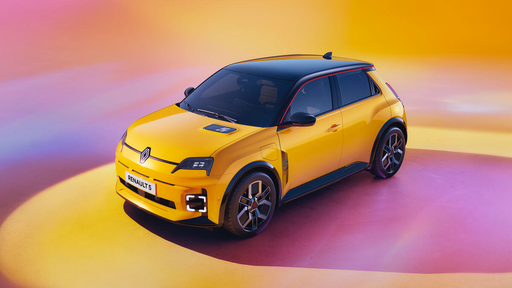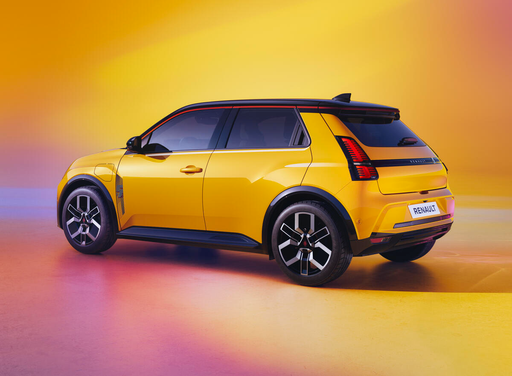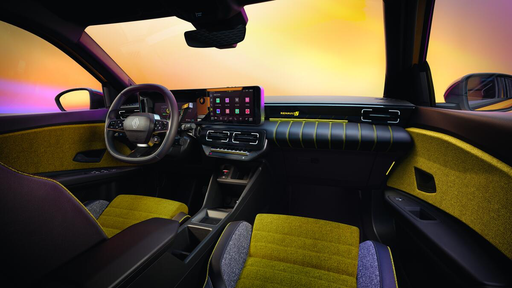Renault R5 vs Toyota C-HR – Differences & prices compared
Both models have their strengths – but which one suits you more?
Compare performance, efficiency, price and space directly: Renault R5 or Toyota C-HR?
Here’s where it gets real: The technical differences in detail
Costs and Efficiency: Price and efficiency are key factors when choosing a car – and this is often where the real differences emerge.
Renault R5 has a noticeable advantage in terms of price – it starts at 23900 £, while the Toyota C-HR costs 29100 £. That’s a price difference of around 5220 £.
As for range, the Renault R5 performs significantly better – achieving up to 405 km, about 337 km more than the Toyota C-HR.
Engine and Performance: Power, torque and acceleration are the classic benchmarks for car enthusiasts – and here, some clear differences start to show.
When it comes to engine power, the Renault R5 has a convincingly edge – offering 540 HP compared to 223 HP. That’s roughly 317 HP more horsepower.
In acceleration from 0 to 100 km/h, the Renault R5 is decisively quicker – completing the sprint in 3.50 s, while the Toyota C-HR takes 7.40 s. That’s about 3.90 s faster.
In terms of top speed, the Renault R5 performs distinct better – reaching 270 km/h, while the Toyota C-HR tops out at 180 km/h. The difference is around 90 km/h.
Space and Everyday Use: Beyond pure performance, interior space and usability matter most in daily life. This is where you see which car is more practical and versatile.
Both vehicles offer seating for 5 people.
In curb weight, the Renault R5 is minimal lighter – 1447 kg compared to 1505 kg. The difference is around 58 kg.
In terms of boot space, the Toyota C-HR offers clearly perceptible more room – 447 L compared to 326 L. That’s a difference of about 121 L.
In maximum load capacity, the Toyota C-HR performs slight better – up to 1155 L, which is about 49 L more than the Renault R5.
When it comes to payload, Toyota C-HR minimal takes the win – 425 kg compared to 418 kg. That’s a difference of about 7 kg.
All in all, the Renault R5 shows itself to be is largely superior and secures the title of DriveDuel Champion.
It impresses with the more balanced overall package and proves to be the more versatile companion for everyday use.
Renault R5
The Renault R5 is a classic hatchback that captured the imagination of drivers with its distinctive design and compact versatility. Its agile handling and efficient performance made it a popular choice in urban settings and winding country roads alike. With a blend of style and practicality, the Renault R5 remains a beloved icon in automotive history.
details @ media.renault.at
@ media.renault.at
 @ media.renault.at
@ media.renault.at
 @ media.renault.at
@ media.renault.at
Toyota C-HR
The Toyota C-HR stands out with its distinctive and bold design that combines sleek, angular lines with a sporty posture. Its comfortable and stylish interior is equipped with advanced technology features, providing a seamless driving experience. The vehicle offers impressive handling and performance, making it a compelling choice for those who appreciate a blend of practicality and flair on the road.
details @ Toyota
@ Toyota
 @ Toyota
@ Toyota
 @ Toyota
@ Toyota
 @ Toyota
@ Toyota
 @ Toyota
@ Toyota

|

|
|
|
|
Costs and Consumption |
|
|---|---|
|
Price
23900 - 137100 £
|
Price
29100 - 42800 £
|
|
Consumption L/100km
-
|
Consumption L/100km
0.8 - 5.1 L
|
|
Consumption kWh/100km
14.8 - 15.2 kWh
|
Consumption kWh/100km
-
|
|
Electric Range
307 - 405 km
|
Electric Range
68 km
|
|
Battery Capacity
40 - 52 kWh
|
Battery Capacity
-
|
|
co2
0 g/km
|
co2
17 - 115 g/km
|
|
Fuel tank capacity
-
|
Fuel tank capacity
43 L
|
Dimensions and Body |
|
|---|---|
|
Body Type
Hatchback
|
Body Type
SUV
|
|
Seats
2 - 5
|
Seats
5
|
|
Doors
3 - 5
|
Doors
5
|
|
Curb weight
1447 - 1524 kg
|
Curb weight
1505 - 1755 kg
|
|
Trunk capacity
326 L
|
Trunk capacity
350 - 447 L
|
|
Length
3922 - 4080 mm
|
Length
4362 mm
|
|
Width
1744 - 2030 mm
|
Width
1832 mm
|
|
Height
1380 - 1498 mm
|
Height
1558 - 1564 mm
|
|
Max trunk capacity
1106 L
|
Max trunk capacity
1076 - 1155 L
|
|
Payload
396 - 418 kg
|
Payload
375 - 425 kg
|
Engine and Performance |
|
|---|---|
|
Engine Type
Electric
|
Engine Type
Full Hybrid, Plugin Hybrid
|
|
Transmission
Automatic
|
Transmission
Automatic
|
|
Transmission Detail
Reduction Gearbox
|
Transmission Detail
CVT
|
|
Drive Type
Front-Wheel Drive, Rear-Wheel Drive
|
Drive Type
Front-Wheel Drive, All-Wheel Drive
|
|
Power HP
122 - 540 HP
|
Power HP
140 - 223 HP
|
|
Acceleration 0-100km/h
3.5 - 9 s
|
Acceleration 0-100km/h
7.4 - 9.9 s
|
|
Max Speed
150 - 270 km/h
|
Max Speed
175 - 180 km/h
|
|
Torque
225 - 4800 Nm
|
Torque
-
|
|
Number of Cylinders
-
|
Number of Cylinders
4
|
|
Power kW
90 - 397 kW
|
Power kW
103 - 164 kW
|
|
Engine capacity
-
|
Engine capacity
1798 - 1987 cm3
|
General |
|
|---|---|
|
Model Year
2025 - 2027
|
Model Year
2024 - 2025
|
|
CO2 Efficiency Class
A
|
CO2 Efficiency Class
C, B
|
|
Brand
Renault
|
Brand
Toyota
|
What drive types are available for the Renault R5?
The Renault R5 is available as Front-Wheel Drive or Rear-Wheel Drive.
The prices and data displayed are estimates based on German list prices and may vary by country. This information is not legally binding.
